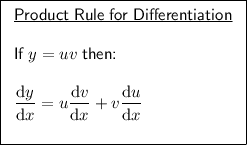Answer:

Explanation:
Given equation:

To differentiate the given equation, begin by taking the natural logarithm (ln) of both sides:

Apply the power law of logarithms to the left side, and the logarithmic property ln(1) = 0 to the right side:

To differentiate an equation that contains a mixture of x and y terms, we can use implicit differentiation.
Begin by placing d/dx in front of each term of the equation:

Differentiate the constant term:

Use the product rule to differentiate the term in x and y.



Note: Use the chain rule to differentiate terms in y only. In practice, this means differentiate with respect to y, and place dy/dx at the end.
Therefore:

So, the final differentiated equation is:

Rearrange the resulting equation to isolate dy/dx:



Therefore, the derivative of the given equation is:
